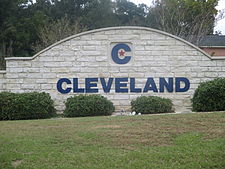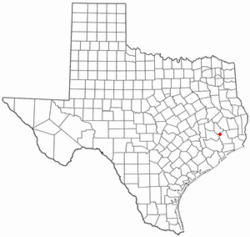Cleveland, Texas
Cleveland, Texas | |
|---|---|
City | |
 | |
 Location in the State of Texas | |
 | |
| Coordinates: 30°20′42″N 95°05′01″W / 30.34500°N 95.08361°W | |
| Country | United States |
| State | Texas |
| County | Liberty |
| Incorporated | 1935 |
| Area | |
• Total | 18.99 sq mi (49.19 km2) |
| • Land | 18.98 sq mi (49.16 km2) |
| • Water | 0.01 sq mi (0.03 km2) |
| Elevation | 150 ft (45.7 m) |
| Population | |
• Total | 7,471 |
| • Density | 434.01/sq mi (167.57/km2) |
| Time zone | UTC-6 (CST) |
| • Summer (DST) | UTC-5 (CDT) |
| ZIP codes | 77327-77328 |
| Area code(s) | 281/346/713/832 |
| FIPS code | 48-15436[3] |
| GNIS feature ID | 1381199[4] |
| Website | www |
Cleveland is a city in the U.S. state of Texas, within Greater Houston metropolitan area and Liberty County. The population was 7,471 at the 2020 census.[2]
History
In 1854, a church and convent were built by Father Peter La Cour near the town's present site. The town began forming in 1878 when Charles Lander Cleveland, a local judge, donated 63.6 acres (257,000 m2) of land to the Houston East & West Texas Railway (now part of the Union Pacific Railroad) for use as a stop, requesting that the town be named for him. Since 1900 Cleveland has served as the junction of this line and the Gulf, Colorado and Santa Fe (now the BNSF Railway). The town was not incorporated until 1935.
The forests around Cleveland, including Sam Houston National Forest, which is located just to its north, are a resort for many inhabitants of the Houston area, who come to camp, hike, hunt, and fish. Cleveland has several historic sites and public recreational facilities, including two parks. The Austin Memorial Library Center offers a wide range of services to the community, and the Texan Theater and the annual livestock show and rodeo, Dairy Days, provide entertainment. Commercially, Cleveland has been a shipping point for timber, lumber, and lumber byproducts since the 1870s. A large medical community, oil, gas, cattle, farm products, and sand and gravel are important to the town's economy. The general trend toward urbanization of the entire area is reflected by the fact that in 1965 Liberty County was added to the Houston Standard Metropolitan Statistical Area. The population of Cleveland grew from 1,200 in 1930 to 7,605 according to the census[3] of 2000.
In 2011, 19 young men and teens (all African-American) from Cleveland were arrested for gang rapes of an 11-year-old mexican girl. Ultimately, 21 persons either pleaded guilty to or were found guilty of crimes connected to the rapes and received punishments ranging from life in prison to probation.
On April 28, 2023, five people including an 8-year-old were killed in a mass shooting outside the town.[5]
Geography and climate
According to the United States Census Bureau, the city has a total area of 4.8 square miles (12 km2), all land. Cleveland's northern boundary is made by the Sam Houston National Forest.[citation needed] The climate is characterized by hot, humid summers and generally mild to cool winters. According to the Köppen climate classification system, Cleveland has a humid subtropical climate, Cfa on climate maps.[6]
Demographics
| Census | Pop. | Note | %± |
|---|---|---|---|
| 1930 | 1,422 | — | |
| 1940 | 1,783 | 25.4% | |
| 1950 | 5,183 | 190.7% | |
| 1960 | 5,838 | 12.6% | |
| 1970 | 5,627 | −3.6% | |
| 1980 | 5,977 | 6.2% | |
| 1990 | 7,124 | 19.2% | |
| 2000 | 7,605 | 6.8% | |
| 2010 | 7,675 | 0.9% | |
| 2020 | 7,471 | −2.7% | |
| U.S. Decennial Census[7] | |||



| Race / Ethnicity | Pop 2010[8] | Pop 2020[9] | % 2010 | % 2020 |
|---|---|---|---|---|
| White alone (NH) | 3,510 | 3,109 | 45.73% | 41.61% |
| Black or African American alone (NH) | 1,819 | 1,599 | 23.70% | 21.40% |
| Native American or Alaska Native alone (NH) | 12 | 24 | 0.16% | 0.32% |
| Asian alone (NH) | 99 | 76 | 1.29% | 1.02% |
| Pacific Islander alone (NH) | 1 | 2 | 0.01% | 0.03% |
| Some Other Race alone (NH) | 7 | 15 | 0.09% | 0.20% |
| Mixed Race/Multi-Racial (NH) | 96 | 237 | 1.25% | 3.17% |
| Hispanic or Latino (any race) | 2,131 | 2,409 | 27.77% | 32.24% |
| Total | 7,675 | 7,471 | 100.00% | 100.00% |
As of the 2020 United States census, there were 7,471 people, 2,729 households, and 1,873 families residing in the city.
As of the 2010 census, Cleveland had a population of 7,675. The racial and ethnic makeup of the population was 45.7% White, 23.7% Black, 1.3% Asian, 13.0% from other races, and 2.5% from two or more races; 27.8% was Hispanic or Latino of any race.[10]
As of the census[3] of 2000, 7,605 people, 2,645 households, and 1,758 families resided in the city. The population density was 1,580.5 inhabitants per square mile (610.2/km2). The 2,976 housing units averaged 618.5 per square mile (238.9/km2). The racial makeup of the city was 58.65% White, 27.13% African American, 0.33% Native American, 0.59% Asian, 11.58% from other races, and 1.72% from two or more races. Hispanics or Latino of any race were 20.51% of the population.
Of the 2,645 households, 34.0% had children under the age of 18 living with them, 42.4% were married couples living together, 19.0% had a female householder with no husband present, and 33.5% were not families. About 29.2% of all households were made up of individuals, and 13.9% had someone living alone who was 65 years of age or older. The average household size was 2.63 and the average family size was 3.27.
In the city, the population was distributed 27.4% under the age of 18, 10.7% from 18 to 24, 29.6% from 25 to 44, 18.3% from 45 to 64, and 14.0% who were 65 years of age or older. The median age was 33 years. For every 100 females, there were 101.0 males. For every 100 females age 18 and over, there were 101.7 males.
The median income for a household in the city was $24,164, and for a family was $28,527. Males had a median income of $28,385 versus $17,889 for females. The per capita income for the city was $13,562. About 19.3% of families and 22.4% of the population were below the poverty line, including 31.8% of those under age 18 and 16.1% of those age 65 or over.
Government
Cleveland operates under the council-manager form of government. Under this system, the mayor and five council members appoint the city manager, who acts as the chief executive officer of the government. The city manager carries out policy and administers city programs. All department heads, including the city attorney, police chief, and fire chief, are ultimately responsible to the city manager. All city council positions are officially nonpartisan. The city operates and maintains these divisions:
- Administration
- Police
- Fire/EMS
- Water and sewer utilities
- Streets
- Building inspection and code enforcement
- Library
- Parks
- Airport
- Cemetery
The Cleveland Unit, a prison for men privately operated by the GEO Group, Inc. on behalf of the Texas Department of Criminal Justice, is in the city, 0.25 mi (0.40 km) from downtown Cleveland.[11]
Education
The city served by the Cleveland Independent School District.
The Tarkington Independent School District, located east southeast of the city of Cleveland, also has a Cleveland zipcode.
Residents of Cleveland ISD (and therefore Cleveland) are served by the Lone Star College System (formerly North Harris Montgomery Community College). Tarkington ISD residents are also in Lone Star.[12]
Transportation
Highways
The major route traveling through Cleveland is U.S. Highway 59, soon to be renamed Interstate 69, traveling southwest towards Houston and northeast into East Texas. U.S. 59 goes through the cities of Livingston, Lufkin, and Nacogdoches, and onward to Texarkana, Texas. US 59 is designated as the TTC-I-69 Corridor. U.S. Highway 59 Business is the original route of U.S. 59, which runs north and south through the center of Cleveland, known locally as Washington Avenue and Loop 573. A current limited-access bypass for U.S. 59 was created due to traffic densities in downtown Cleveland that rivaled those of many large cities.[citation needed] SH 105 travels east and west, and Cleveland is roughly the halfway point between Beaumont and Navasota. SH 105 runs concurrently with SH 321 until SH 105 splits, going eastbound to Beaumont, while SH 321 continues roughly 20 miles (32 km) further south into Dayton. Construction was recently completed on a loop coming off SH 105 near Pin Oak Road, along the southern side of Cleveland, crossing Interstate 69 and FM 1010, and terminating at SH 321 near New Salem Road.
Railroads
Cleveland is the meeting point of two rail lines. One is a north/south Union Pacific line that closely follows the path of Interstate 69/U.S. Highway 59. The other is an east/west Burlington Northern Santa Fe line that roughly follows FM 787 to the east, and SH 105 west towards Conroe. Union Tank Car Company has a tank repair/maintenance facility along the BNSF line on the outskirts of Cleveland off FM 787.
Airports
Cleveland Municipal Airport, a general-aviation airport, is in Cleveland. George Bush Intercontinental Airport in Houston is the closest airport with commercial airline service.
Notable people
- Jason Grimsley was born in Cleveland and went to school in Tarkington ISD, just east of town on State Hwy 321. Grimsley pitched for the Philadelphia Phillies, Cleveland Indians, Anaheim Angels, New York Yankees, Kansas City Royals, Baltimore Orioles, and Arizona Diamondbacks
- Gib Lewis, a Speaker of the Texas House of Representatives, spent his formative years in Cleveland. He graduated from Cleveland High School in 1955 and enrolled at Sam Houston State College (now Sam Houston State University ) in Huntsville, Texas. Elected speaker for the first time in 1983, Lewis became the first to hold that office for five terms.
References
- ^ "2019 U.S. Gazetteer Files". United States Census Bureau. Retrieved January 20, 2021.
- ^ a b "Total Population: 2010 Census DEC Summary File 1 (P1), Cleveland city, Texas". data.census.gov. U.S. Census Bureau. Retrieved January 20, 2021.
- ^ a b c "U.S. Census website". United States Census Bureau. Retrieved January 31, 2008.
- ^ "US Board on Geographic Names". United States Geological Survey. October 25, 2007. Retrieved January 31, 2008.
- ^ "Five dead including an 8-year-old at an "execution-styled" shooting in Texas". ABC News. April 24, 2023. Retrieved April 29, 2023.
- ^ Climate Summary for Cleveland, Texas
- ^ "Census of Population and Housing". Census.gov. Retrieved June 4, 2015.
- ^ "P2 HISPANIC OR LATINO, AND NOT HISPANIC OR LATINO BY RACE – 2010: DEC Redistricting Data (PL 94-171) – Cleveland city, Texas". United States Census Bureau.
- ^ "P2 HISPANIC OR LATINO, AND NOT HISPANIC OR LATINO BY RACE - 2020: DEC Redistricting Data (PL 94-171) - Cleveland city, Texas". United States Census Bureau.
- ^ 2010 general profile of population and housing characteristics from the US census for Cleveland
- ^ "Cleveland Unit Archived 2010-07-25 at the Wayback Machine." Texas Department of Criminal Justice. Retrieved on May 10, 2010.
- ^ Texas Education Code, Sec. 130.191. LONE STAR COLLEGE SYSTEM DISTRICT SERVICE AREA..


